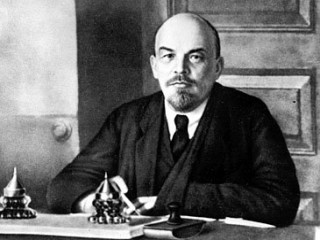
Vladimir Ilyich Lenin biography
Date of birth : 1870-04-22
Date of death : 1924-01-21
Birthplace : Simbirsk, Russian Empire
Nationality : Russian
Category : Politics
Last modified : 2011-08-30
Credited as : Political leader, founder Communist party,
0 votes so far
Lenin was born Vladimir Ilich Ulyanov on April 22, 1870, in the provincial city of Simbirsk on the Volga River. By all accounts, Lenin's middle-class family was warm and loving. Lenin's father was a secondary-school teacher who rose to become a provincial director of elementary education. His mother was also taught. Both were deeply concerned with the popular welfare, and Lenin, along with his two brothers and two sisters, absorbed at an early age both a desire to learn and an intense commitment to improving the lives of ordinary Russians. In 1887, shortly after the death of his father, Lenin's older brother Aleksandr was arrested in Saint Petersburg for plotting against the tsar. He was convicted and hanged. The tragic event affected young Vladimir deeply, but there is no reason to believe that it caused him to embrace the revolutionary movement. Instead, he immersed himself in radical writings, particularly those of Karl Marx and Nikolai Chernyshevsky, and continued his education. Graduating from high school with a gold medal, he entered the University of Kazan but was expelled and exiled because of his developing radical views. In 1891, however, he passed the law examinations at the University of Saint Petersburg as an external student, scoring first in his class. He practiced law briefly in Samara before devoting himself full time to revolutionary activities.
Lenin studied the problem of revolutionary change in Russia from a Marxist perspective and worked out the essential features of what has come to be called Leninism. Convinced with other Marxists that the development of industrial capitalism in Russia held the key to radical social change, Lenin remained troubled by the inability of Russian workers to develop spontaneously - as Marx had predicted - a radical consciousness capable of effective political action. In this the workers behaved like the peasants, whose failure to respond to radical appeals had frustrated populist revolutionaries for years. To solve the problem Lenin developed the notion that a radical consciousness had to be cultivated among workers through agitation by a well-organized revolutionary party.
Between 1893 till 1917, Lenin worked underground in Russia and abroad for the revolutionary cause. During this time the Social Democratic party was formed; within it developed an uncompromising revolutionary group, the Bolsheviks, and of this group Lenin was the leading spirit. In April 1917, he and his fellow exiles returned. After the October Revolution, he headed the new government having to face both war and anarchy.
Lenin moved quickly to consolidate Bolshevik power. He reorganized the various party factions into the Russian Communist party, established a secret police (the Cheka), and totally reconstituted the desperate Russian economy along Marxist principles. In order to bring the country out of the war, he accepted a humiliating peace treaty with Germany in 1918. That same year civil war broke out, and he was forced to put a Red Army in the field against dissident forces. The dissidents, known as the Whites, were supported by the Allies and were not defeated until 1921.
By that time the Russian economy was in shambles, and discontent among peasants and workers was dangerously widespread. In the face of such problems Lenin was forced to back away from his pure Marxian policies, instituting the New Economic Policy. He granted economic concessions to foreign capitalists in order to encourage trade; he placed some light industry and most retail operations back into private hands; and to appease the peasants he permitted them to sell their produce on the open market. Despite these minor concessions, Lenin continued to press forward toward his goal of a Marxist Russia - and eventually a Marxist world.
On May 25, 1922, Lenin suffered a stroke that left him partially paralyzed. A series of strokes followed, and he died on Jan. 21, 1924, at the age of 53, the most revered personage - apart from Marx himself - in the world of communism.
















